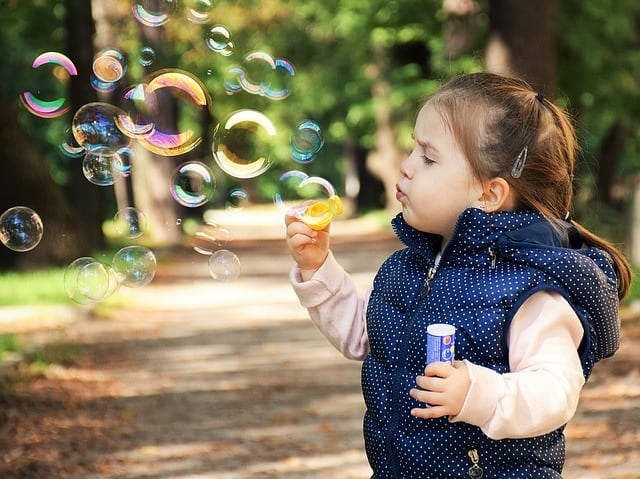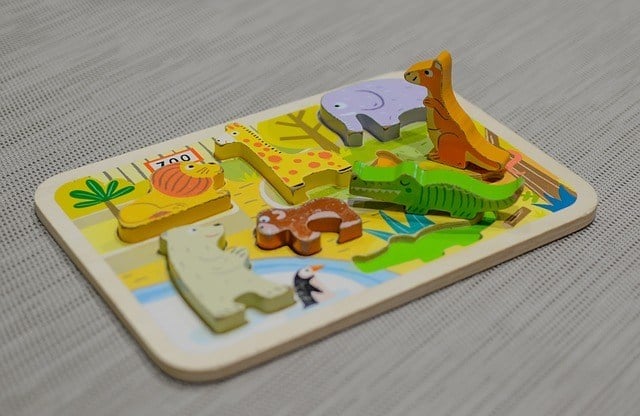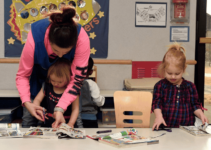What are the Executive Functions?
Executive functions are the set of mental processes that help us get things done.
These functions are critical for skills that are important for success in the 21st century, such as creativity, flexibility, self-control, and discipline.
Executive Functions represent higher-order cognitive processes that are responsible for regulating our goal-directed behaviors and adaptive responses to situations that are new, complex or challenging. [1]
They are needed in those situations when going on automatic or relying on instinct or intuition would be ill-advised, insufficient or impossible. [2]
Executive Functions are connected to all areas of our life and are necessary for our mental and physical health.
This is why it is important that we help children improve these skills.
Table of Contents
- What are the Executive Functions?
- Working Memory
- Cognitive Flexibility
- Self-control
- How do Working Memory, Cognitive Flexibility and Self-Control work together?
- The development of Executive Functions
- What are the signs of Executive Function challenges?
- The importance of Executive Functions in Social Interactions
- Executive Function and ADHD
- Executive Function and Dyslexia
- Executive Functions and Helicopter Parenting
- What to do if I suspect my child has Executive Function Challenges?
- What are the things that you can do at home?
The Executive Trio: Working Memory, Cognitive Flexibility and Self Control
Executive Functions are often referred to as our brain’s Chief Executive Officer.
They regulate our focus, allow decision-making, help us remember information, monitor and adjust the level of control over our impulsive reactions and much more.
Many view Executive Functions as being comprised of three categories of processes:
- Working memory
- Cognitive flexibility
- Self-control
Let’s dive a bit deeper into the purpose of each of them.
Working Memory
Working Memory is our brain’s short term storage. It is the place where we both place information and use it to work through a problem.
Working memory governs our ability to retain and manipulate pieces of information. [2]
Why do we need good Working Memory?
Without a functioning working memory, you’d be having a hard time understanding longer sentences. While you’re reading, your brain stores all of the words in this temporary storage and keeps it there long enough for you to understand the words, the connection between the words and the point a writer is trying to make.
Arithmetic would be a nightmare without a functioning working memory. When somebody wants to test your multiplication skills, your brain must be able to register the numbers you are to multiply, to use the information to multiply them, then register the correct answer and respond with the result of your multiplication.
When you’re listening to the instructions for setting up a new device or are trying to follow a recipe for cooking a meal, working memory is the one in charge of keeping that information on your mind long enough for you to do something with it – to get yourself to turn in the right direction or to mix all of the ingredients correctly for the meal.
For people with poor working memory, listening to voicemail can be quite challenging.
Keeping the number in your mind long enough to take a piece of paper and start writing it down requires for you to focus on multiple tasks at once: listening to the person dictating the number to you, remembering the information, and taking the pen and paper and writing the number down while recalling the information retroactively.
Cognitive Flexibility
Cognitive flexibility helps us maintain or shift focus depending on the task in front of us.
It helps us in changing strategy when solving a problem, once the old turns to be no longer useful. Cognitive flexibility allows us to think “outside the box”, see different perspectives and adapt to changed circumstances.
These processes are necessary for what we call creativity, flexibility or innovativeness.
Why do we need Cognitive Flexibility?
Imagine that you start working on a problem.
You quickly see that your strategy is not applicable. Your cognitive flexibility would let you try a new route and evaluate where it leads you.
It also enables you to stay focused on trying one thing at a time while allowing you flexibility to drop the task once you have an urgent one in front of you.
If we were the opposite, cognitively rigid, we’d have a lot of problems in shifting to another task. We’d stay stuck in repeating the same wrong solution. We would not be able to stop and reflect on what we’re doing wrong and try something new.
It would be extremely hard for us to look at things from any other perspective than our own. To be able to understand another person’s point of view you need to be able to temporarily put your own aside. This task would be almost impossible without Cognitive Flexibility!
It would be hard for us to change our ways and adapt to various circumstances. Adjusting our response to others, working through different challenges, reacting to adversities and finding new ways to cope would be quite hard.
Self-control
Self-control enables us to stay focused on our priorities and resist the temptations of impulsive actions or responses.
Self-control allow us to stay on top of our tasks and delay short-term gratification to be able to achieve long-term success with our goal.
Why do we need good self-control?
It is those processes that make us turn off the TV, put away social media, reschedule coffee with friends and get things done at home or at work.
For kids, it is what helps them stop staring at a game and finish homework, or continue putting a puzzle together even though somebody walks in the room.
These processes enable us to assess a situation and choose a more adaptive or desired response, rather than reacting on impulse. This includes our ability to develop healthy coping skills or deal with frustration.
How do Working Memory, Cognitive Flexibility and Self-Control work together?

For instance, self-control supports working memory in a way that allows us to direct our attention to what we’re working on, while suppressing all of the other impulses to do or think about something else.
Listening to the teacher in class and taking notes is an example of how these two complement each other.
Cognitive flexibility combined with working memory allows us to take an alternative route in solving a problem that we’ve been unsuccessful with until that moment. Just think of guessing the answer to a riddle or trying to figure out how to solve a puzzle.
Cognitive flexibility and self-control are necessary for resolving conflicts. To be able to understand the behavior of others, we need to be able to look at the situation from a different perspective and control our urge to snap out from anger. The combination of these two is what helps us acquire coping skills.
So, when we talk about Executive Functions, we are talking about the ways these mental processes are interacting to produce purposeful behavior. The complexity of the Executive Functions varies as we acquire different experiences.
The development of Executive Functions
The Executive functions aren’t born being the brain’s CEO.
Like most successful executives, they need practice and experience to achieve their potential. The more they work, the more they are able to improve.
The necessity of growth-promoting environment
We are not born with skills that enable us to prioritize, manage distractions, organize our time, weigh decisions or control our impulsiveness.
However, we are born with the potential to develop them.
The level to which different Executive Function skills develop depends on our experiences through life.
To develop Executive Function skills, children need growth-promoting environments that will provide them with opportunities to practice Executive Function and self-regulation skills.
Growth-promoting environments are the ones that allow them to experience challenges, resolve problems, and learn through what they do, and all with the support and guidance of adults.
This includes activities such as creative and interactive play at an early age, planning and doing chores at home, and initiating and completing assignments at school.
Executive Functions develop at a different pace
Even with an adequate environment, not all skills develop at the same time or at the same pace.
Although Executive Functions emerge during the first few years of life, according to cognitive and neurophysiological assessments, they continue to develop significantly through childhood and adolescence. [3]
For instance, the ability to control our attention appears to emerge early on in infancy and tends to develop quite rapidly in early childhood.
On the other hand, cognitive flexibility, goal setting and information processing develop the most between 7 and 9 years of age. Notice how this is at the beginning of person’s schooling! [4]
Our ability to use our short-term memory storage and manipulate information develops quite early as infants. However, that capacity is limited to only one to two things.
The ability to hold more than two pieces of information in working memory takes more time to develop. Cognitive flexibility builds on working memory and self-regulation and comes later in development. These skills tend to mature when a child is around 12 years old. [4, 5]
Executive Functions continue to develop through life
Early experiences in life that affect positive development of these skills seem to be very important. There is research that shows that shows that children who have better self-control are more likely to make better choices and have better physical and mental health.
This research study had around 1000 participants who were born in the same city and in the same year and were followed for 32 years with a 96% retention rate. Better self-control included behavior such as being better at waiting your turn, being less easily distracted and less impulsive, and more persistent.
As teenagers, these kids were more likely to still be in school and less likely to make risky choices, such as smoking or taking drugs. As adults, they were less likely to be overweight or to have high blood pressure or substance abuse problems. [6]
However, it is not just childhood experiences that are important and predictive of our children’s future success. There is still a lot of research being done about cognitive and neural development during puberty and adolescence. Adolescents develop a capacity to hold more multidimensional concepts and become able to think in a more strategic manner.
According to neuro-studies, while sensory or motor brain regions become fully myelinated in the first years of life, neurons in the frontal cortex continue to be myelinated during adolescence. The frontal cortex is where the Executive Functions are “located”, and myelin increases the speed of transmission of electrical impulses from neuron to neuron.
So, the speed of transmission of neural information in the frontal cortex increases throughout adolescence, allowing reasoning, complex problem-solving, self-reflection and other important skills to mature during this period. [7]
What are the signs of Executive Function challenges?
Executive Functions is a buzzword in schools.
Kids are expected to pay attention in class, to remember what they have for homework, to organize their folders, to complete assignments and so on.
It makes sense that once the kids are in school, we start paying more attention to the skills that make these activities possible.
However, that does not mean that we cannot spot the signs of Executive Function challenges earlier in their development.
What are the activities affected by Executive Function challenges?
Executive Function challenges affect those activities that require us to:
- Concentrate and stay concentrated
- Switch focus from one thing to another
- Remember instructions, rules, information
- Find the link connecting two or more events, things, concepts
- Organize what they are learning
- Plan the steps of their action
- Reflect, analyze and monitor their behavior
- Adjust to a new situation
- Control their impulsiveness
- Think through their actions
- Assess and manage time
Taking notes in class, organizing study material or managing homework are, of course, some of the activities that are affected.
It is important to notice that just because your child has difficulties organizing their study material, it does not necessarily mean that they have Executive Function challenges.
Organization challenges tend to manifest in more than just one setting; the child struggling with Executive Function challenges is likely to have difficulties organizing their toys or their chores just as much as they are struggling to understand a word problem in Math class.
The signs of Executive Function challenges in School
The number of expectations from a child significantly increases once they start school.
Here are the behaviors through which Executive Function challenges can be detected in school.
The student:
- Easily gets distracted in class
- Forgets what they have for homework
- Has messy notebooks, folders, desks
- Overestimates or underestimates the time they need to finish something
- Experiences difficulties in solving long word problems
- Has trouble following the instructions
- Has a hard time starting their work
- Can’t seem to stay focused on the task at hand
- Has difficulties planning and executing a plan
- Promises to get something done and forgets what they promised
In practice, it might be hard to distinguish the lack of capability and the lack of motivation.
What usually serves as an indicator for psychologists is that the lack of capability manifests in those activities that the child actually enjoys.
For instance, they love playing with their friends but still struggle to wait their turn or remember the rules of the game they are playing in addition to having a hard time remembering their teacher’s instructions or staying focused on a school problem.
The signs of Executive Function challenges in Preschool

This is why we don’t need our children to start school to detect some of the challenges with Executive Functions.
Here are some of the examples of how they can be seen in preschool. The child:
- Appears to be listening when you’re giving them instructions, but then forgets about everything you said moments later
- Misses the point of what you are saying and focuses on unimportant details
- Has trouble remembering directions or instructions
- Gets bored quickly with what they are doing and is constantly looking for something new
- Has trouble organizing their thoughts when telling you about their day
- Gets frustrated easily when they can’t complete the activity they started
- Has angry outbursts in the face of things that seem relatively manageable
- Can’t wait for their turn in the game or to say something
- Has a hard time trying a new strategy once the old one doesn’t work (like trying to connect two pieces of puzzle even though they see or are told that they do not go together)
- Gets frustrated when you interrupt them in something they are doing
- When interrupted, quickly jumps to the next activity without going back to the original one later
- Doesn’t like changes in routine or plans
- New people or situations cause them to feel uneasy
- Has a hard time saying that they are experiencing problems and is likely to act out instead
- Can’t explain why they made a certain choice – often feel guilty or confused by their own actions
- Acts inappropriately without realizing it
- Has a hard time learning from their previous experience or implementing those lessons learned
Executive Functions are crucial for our interactions with others; having deficits in Executive Functioning can significantly interfere with our ability to have healthy relationships with others.
Just try not paying attention to what your friend or partner is saying and you’ll quickly see how damaging that can be for a relationship. Or, act as if you’ve forgotten about the plan your friend and you had for the day.
Executive Functions enable us to remember and commit to plans. Active listening takes focus, which is another thing that Executive Functions are in charge of, as well as the ability to understand different perspectives and suspend the urge to act-out.
So, Executive Functions help us immensely in our social functioning. If they are doing the job well, we are likely to be seen as a good listener, reliable, punctual, responsible, acting appropriately, well-adjusted, etc.
Kids who are struggling with Executive Functioning might have difficulties in social functioning.
Here are some of the situations that include social interactions with others that children with Executive Functioning challenges would find difficult:
- Playing structured games or sports.
In team sports or board games, there are rules and instructions to follow. To participate, you need to stay focused, patiently wait your turn, follow the rules and listen actively to the instructions without getting distracted.
- Following-up with plans
Plans include details such as time, place, number of people, activities…While plans were being made, kids with Executive Function challenges might have been distracted, or struggling to memorize the details they quickly forgot and were embarrassed to check whether they got right.
So, they are likely to miss the activity, forget about the activity or may show up late.
- Sharing experience or opinion
To tell a story or share experience, you need to organize the content you want to convey to others. Now, when the content is your own experience that you’re struggling to recall, yet alone position on a timeline, the challenge of telling a story is even more challenging.
These kids are likely to be seen as confusing or disorganized. This is why, after many unpleasant experiences, when they are asked how their day was, they respond with simple: “It was fine.”
- Fitting in a new group
Kids with Executive Function challenges might have difficulties in understanding the rules of the new social context – what’s allowed and what’s not.
Since they might be struggling with poor attention span and impulse-control, they are likely to have trouble finding new people to play or communicate with. If they had enough negative experiences, they are likely to see themselves as a bit “weird.”
Executive Function and ADHD
According to one meta-analysis of 83 studies, with more than 3700 participants with ADHD and over 2900 without it, groups with ADHD showed significant impairment on all Executive Function tasks. The biggest deficits are noticed in measures of response inhibition, vigilance, working memory and planning. [8]
These weaknesses in Executive Functioning were significant in groups that were both clinic-referred and community samples. They cannot be explained by differences in intelligence, academic achievement or symptoms of other disorders.
However, Executive Function challenges are not enough to explain the cause of ADHD. They just appear to be an important component of complex neuropsychology of ADHD, according to the researchers.
So, if your child has been diagnosed with ADHD, they are likely to be experiencing Executive Function challenges in different domains of their lives.
Those challenges are likely to be recognized as:
- Challenges in maintaining focus
- Remembering plans, instruction, information, details
- Planning and organization (assessing resources, such as time and energy)
- Executing plans (following the steps)
Executive Function and Dyslexia
Children with Dyslexia show deficits in several Executive Function domains, specifically related to verbal and visual short term processing and visual-spatial and auditory attention. [10]
Now, what does that mean in a practical sense?
- Kids challenged with Dyslexia will have harder time focusing and understanding verbal material, such as you telling them instructions on how to complete a certain task.
- They have harder time remembering words, which is why it is often useful to use visuals or tactile materials in working with these kids. When it comes to understanding where something is in space, which we could refer to as visual-spatial information, kids with Dyslexia are likely to experience difficulties. It is not uncommon for these kids to have challenges distinguishing what’s left and what’s right.
- They will have harder time manipulating information that involves words or visuals. Asking them to do arithmetic in their head is hard for them. You’ll see that they are able to give a much faster response once they can put the information on paper. This is the way to take the weight off of their working memory.
- When working with these kids on Executive Function challenges, the work is dominantly focused on improving their attention span for verbal/auditory material, their understanding of spatial relationships, and improving working memory’s capacity for verbal material.
Executive Functions and Helicopter Parenting
We have already mentioned how growth-promoting experiences are necessary for the proper development of Executive Functions.
That means that your child needs to have opportunities to experience problems and challenges and work on resolving them in a supportive environment.
Some parents tend to see support in terms of absolute protection. Helicopter parenting implies resolving problems for your kids, micromanaging their activities and tackling every obstacle that comes in the way of their success.
However, that is a good way to limit your child’s opportunities to learn how to handle challenges on their own.
If you don’t let your kids deal with problems, the biggest problem they’ll end up having is you. By giving your kids chances to trip and fall, fail and learn, and grow from their mistakes, you are providing experiences that will allow them to improve their Executive Functioning.
The difference between good managing and micromanaging is that you help people analyze and solve problems with your support, rather than doing that for them.
Here are a few examples:
- Delegate responsibilities around the house. Don’t go and clean their rooms. Assign them a task and let them organize it themselves. Encourage them to give it their best shot, and if they struggle, let them come to you. When going back to their room with them, don’t take over the task. Ask them what they’re struggling with and offer them a few solutions about how they might resolve their struggle.
- When they complain about their friends mistreating them, don’t call their parents right away. We know that it’s the hardest to watch your kid in pain. But, getting in the way at the first sign of struggle isn’t beneficial for them. Thank them for sharing and encourage them to keep you involved. Try to understand how they are being mistreated, help them figure out a solution and track the progress with a new strategy.
- Don’t do their homework for them. If your child really needs you, do homework with them. Help them figure out how to do the homework. Facilitate independence. A well-deserved C they can claim as their own is much more valuable than higher grades that they don’t feel are theirs. The pressure in school is high and you want your kid to do their best. Encourage them to do so and assist them when they are in need, but don’t do their work.
Our brains need problems to be able to grow. Problems give us chances to put our potential to work.
What to do if I suspect my child has Executive Function Challenges?
If you can recognize struggles with Executive Functioning, the best option is to consult with an expert – psychologists, psychiatrists, neurologists. They will assess your child’s abilities and guide you through the process of improving them or learning how to manage deficits if there are any.
For example, clinical child psychologists can administer tests for challenges with Executive Functions. They can also diagnose ADHD and mental health issues. Sometimes, behaviors that might look like Executive Function challenges might have different roots, such as anxiety or specific learning disabilities.
There are many things that could be “prescribed” – from therapy to coaching, to practical skills to practice at home.
What is important is to understand where the challenges stem from and how they manifest in a child’s behavior, and to try different strategies that can then be evaluated through time.
A lot of research is still being conducted about the most efficient ways to help kids with Executive Function challenges.
Some of the current findings suggest that programs that include computerized training, combination of computerized and interactive games and also traditional martial arts and add-ons to school curricula called Promoting Alternative Thinking Strategies and the Chicago School Readiness Project can be quite effective in helping kids improve Executive Functioning. [2]
What are the things that you can do at home?
The best way to work on the improvement of Executive Functions is to provide children with experiences that facilitate them.
Teaching them how to wait their turn, ease their anxiety or control their anger, and delay gratification instead of giving them whatever they want is a good way to start.
There is research that suggests that helping kids develop self-regulation or impulse control skills, along with their early academic abilities, may be the most effective strategy in helping kids succeed in school. That makes a lot of sense, because these are the skills that are necessary for them not only to resist the temptations of distractions, but also to learn how to cope with negative outcomes, to understand their anger, and think through their decisions rather than acting impulsively. [11]
1. Use activities to practice working memory and cognitive flexibility
Working memory and cognitive flexibility can be practiced through games such as puzzles, memory games, different board games or activities such as putting together a piece of furniture, or cooking.
Giving them an opportunity to structure their play by giving them material such as clay or play-dough is also a good way to help them awaken creativity and flexibility in thinking.
2. Offer activities that help them learn how to concentrate
Offer those activities that have them concentrate and keep focus during certain periods of time. Those can be simple topic-based conversations or bedtime stories, learning songs and poems together, or doing crafts together (origami, drawing together, making something out of wood or clay).
3. Practice communication
Give them opportunities to interact with peers and with you as a parent.
This will provide them chances to experience social rules, to better understand the behaviors of others in a social context, and to learn what is appropriate and what is not.
4. Lead by example
Model experience sharing. Tell them something about your day and ask them about theirs.
Your child is likely to imitate your reactions when it comes to impulse control. Try teaching them how to stop and think about their feelings, breathe and respond thoughtfully.
5. Put them in a decision-making situation
Give them a chance to take different options into consideration, even if it’s as simple as: “What would you rather have for dinner: mac and cheese or a hamburger?”
Consciously thinking about their choices is important in learning about how to make decisions.
References:
- Rubenstein, J. L., & Rakic, P. (Eds.). (2013). Neural Circuit Development and Function in the Healthy and Diseased Brain. Academic Press.
- Diamond, A. (2013). Executive functions. Annual review of psychology, 64, 135-168.
- Best, J. R., & Miller, P. H. (2010). A developmental perspective on executive function. Child development, 81(6), 1641-1660.
- Anderson, P. (2002). Assessment and development of executive function (EF) during childhood. Child neuropsychology, 8(2), 71-82.
- Davidson, M. C., Amso, D., Anderson, L. C., & Diamond, A. (2006). Development of cognitive control and executive functions from 4 to 13 years: Evidence from manipulations of memory, inhibition, and task switching. Neuropsychologia, 44(11), 2037-2078.
- Moffitt, T. E., Arseneault, L., Belsky, D., Dickson, N., Hancox, R. J., Harrington, H., … & Sears, M. R. (2011). A gradient of childhood self-control predicts health, wealth, and public safety. Proceedings of the National Academy of Sciences, 108(7), 2693-2698.
- Blakemore, S. J., & Choudhury, S. (2006). Development of the adolescent brain: implications for executive function and social cognition. Journal of child psychology and psychiatry, 47(3‐4), 296-312.
- Willcutt, E. G., Doyle, A. E., Nigg, J. T., Faraone, S. V., & Pennington, B. F. (2005). Validity of the executive function theory of attention-deficit/hyperactivity disorder: a meta-analytic review. Biological psychiatry, 57(11), 1336-1346.
- Pickering, S. J. (2012). Working memory in dyslexia. In Working memory and neurodevelopmental disorders (pp. 21-54). Psychology Press.
- Varvara, P., Varuzza, C., Padovano Sorrentino, A. C., Vicari, S., & Menghini, D. (2014). Executive functions in developmental dyslexia. Frontiers in human neuroscience, 8, 120.
- Blair, C., & Razza, R. P. (2007). Relating effortful control, executive function, and false belief understanding to emerging math and literacy ability in kindergarten. Child development, 78(2), 647-663.










